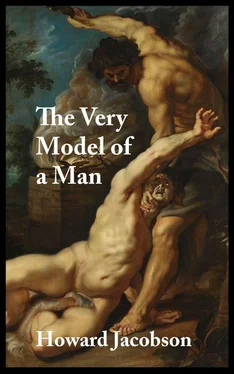‘A wanderer and a fugitive shalt thou be, but I shall follow thee all the days of thy life; and it shall be in thine heart as though MY NAME burns across thy forehead.’
My punishment, I said, is greater than I can bear.
‘Bear it,’ said the bird.
A silvered light, as horrible as dawn, began to pull at the frayed edges of the night. Another day. All at once I was very tired. I needed to sleep or I needed to see Abel, or I needed to do both. My father would already be awake, dematerialising matter, working towards his illusion to end illusions, when the abundant breeding world itself would pass from his right hand to his left hand and thence melt away altogether. In no one’s sight — for no one’s pleasure — but his own. My mother would still be in her bed, coiled against the blow in certain expectation of which she expended all her days.
I sat upon a stone, holding my face between my hands, listening to her calling to me. Cain… Cain… My name round as a pebble in her mouth. My anger soothed before it had exploded. My crimes forgiven before I was a criminal. Had she ever called to me like this in reality, or was it a dream? Did I have a mother only in my head? Could I carry her with me, therefore, and by the same token leave myself behind?
‘Cain… Cain…’ This time a real voice spoke — jealous God through jealous bird — saying: ‘Arise and go.’
And I looked into the raven’s eye, scorched with disgust and greed, and I arose and went.
‘A hit!’ exclaims Naaman. ‘They all love you. That bird!’
‘Just a bird,’ says Cain. ‘About the tower…’
‘Yours,’ says Naaman. ‘All yours.’
‘And I may build as high as fancy takes me?’
‘Higher! The clouds themselves need not obstruct you. Punch holes in the celestial sphere if you have a mind to. Throw a ladder up to Shamash or whoever.’
‘The celestial is not my goal,’ says Cain. ‘Neither is the sun.’
‘Up to you. Up to you. Aim where you like. And don’t ever come down if you’re happy. Remember: nothing is withholden from you. Ask and it shall be given. Speak and it shall be done.’
‘You sound like a god.’
Naaman laughs. ‘You have gods on the brain,’ he says.
* * *
No two witnesses agreed. Depending on which reports you trust, Cain’s Tower — variously misattributed to Marduk, Nemo and Nimrod, mistaken for the House of the Foundation of Heaven and Earth (otherwise Etemenenanki), and misnamed the Tower of Babel, as though there were only one — rose seven and a half or seventy miles into the air, was five or fifty miles in circumference, and threw a shadow it took a horseman one or one hundred days to ride out of.
From the summit of the tower either you beheld the cities of Ur and Larsa and Erech, like wisps of white smoke from a single hookah, or you beheld nothing except your own reflection magnified in cloud. If we follow the calculations of some who made measurements with compasses and T-squares, a trowel dropped from the last tier to be completed is falling to this day; whereas others, marvelling less at the majesty of the building than at the mayhem it occasioned, described displaced masonry regularly showering the city of Babel, threatening the safety of anyone who took bareheaded to the streets, but especially those whose livelihoods depended on their performing augury or fairy-stories around the tower’s base.
One eyewitness tells of an almanac salesman with raisin eyes, killed because the quantity of paper tied to both his feet hampered his escape from a flying tile. But it was also said of him that he deliberately stood his ground, while others fled, declaring that there was some fatality in his family, that the curse had come upon him, that it was written — ‘Pass it on.’
As to how many masons and hod-carriers and plasterers and carpenters and surveyors and sculptors and mosaicists and mathematicians were employed on the edifice — no estimate bears any similarity to the next. By some reckoning the total workforce, not including wives and shuris, was five hundred thousand; but there were, and still are, those who maintain that Cain worked alone on his mausoleum, completing a storey every three months, performing single-handedly all the functions mentioned above, always without having recourse to materials that included earth and water in their composition, and always without recourse to wives or shuris.
Citizens of Babel fearful of the structure claimed they had irrefutable evidence that its atmosphere induced morbid retentiveness of memory, and forbade their children to go within a thousand royal cubits of its influence. But many workmen on the tower who returned to the community either because they had grown old in Cain’s service, or because they had been fired for refusing to work twenty-four-hour shifts, or because they had suddenly lost their enthusiasm for elevation, swore that their powers of recall had deteriorated out of measure as a consequence of labouring close to the magnetic fields of other planets, and supported this assertion, in the presence of elders, by forgetting what they’d just asserted.
For obvious reasons, opinions have always been still more divided over what took place in celestial circles as heaven’s guards and watchmen observed Cain’s progress. The view most commonly held by scientific and rationalist commentators is that scepticism, and even pity, must have prevailed; since the most rudimentary assessment of likely danger or damage would have established the impossibility of Cain’s posing any serious territorial threat had his life been extended to ten thousand times its expected span. Quite simply, the tower was never going to reach.
But those of more fantastical turns of mind imagine a God beset by petulant and panicked counsellors, who saw the zooming ziggurat as a symbolic if not an actual threat to their hegemony, and a promise that matter would at last, however long it took, assert superiority over spirit. They had opposed the original creation of Adam on just such grounds. True, they had softened when it came to judgement on the fratricide, because Cain’s murderousness seemed then to be their own best hope for the future — matter, left to itself, would destroy itself. But now they insisted that he should be reminded of the sentence leniently passed on him: that he be a wanderer and a fugitive in the earth, not among the clouds.
Pull him down, was their advice.
At last, as everyone agrees, the decision was God’s alone. There is evidence that He never did much care, aesthetically or practically, for buildings. The sublunary world was His idea, was put together after a blueprint of His own, and He knew how He wanted it to look. He was also familiar with the incidence, among city dwellers, of imploded humanism: put a man within doors and he quickly comes to believe immoderately in himself.
This was reason enough to raze a pile capable of housing half the world. But when the hour finally did come for Him to wield His arm, He made no bones about the thing that had upset Him most. His mighty ear, upon which not the slightest or least formed thought was lost, had picked up an intention buried beneath the lowliest brick in the building. It was to make a name. Which does not mean merely to find fame, but to speak it. To pronounce sufficiency. To word itself abroad. To glorify expression.
Nomenclature had been at the heart of God’s disagreement with His creatures from the start. He had foreseen evil as a problem, He had anticipated knowledge, pride, sex, snakes. But He was not prepared for names to come between them, forgetting how essential to His idea of Himself was His Own. I AM WHAT I AM — Cain’s refusal to offer sacrifice was nothing other than an unwillingness to accept the obligations of obeisance inherent in That Name. YOU ARE, Cain as good as told Him, WHAT YOU ARE NOT.
Читать дальше











